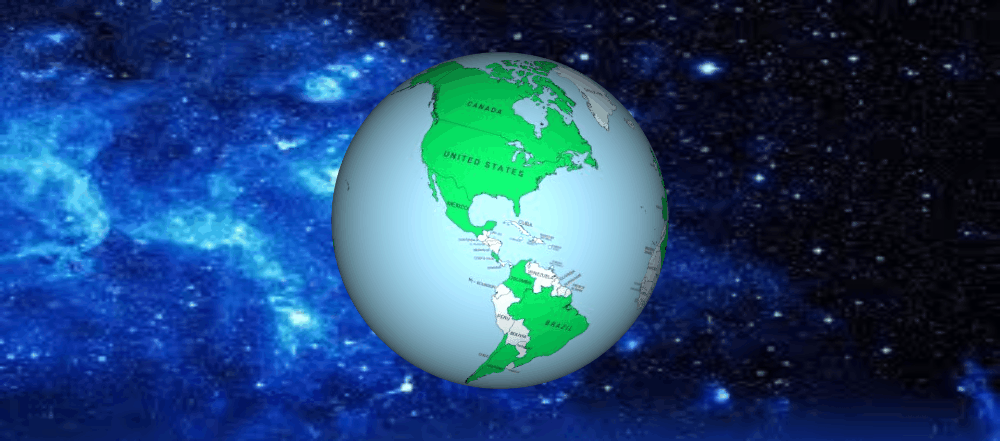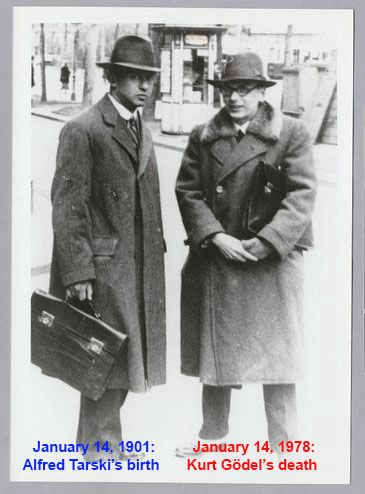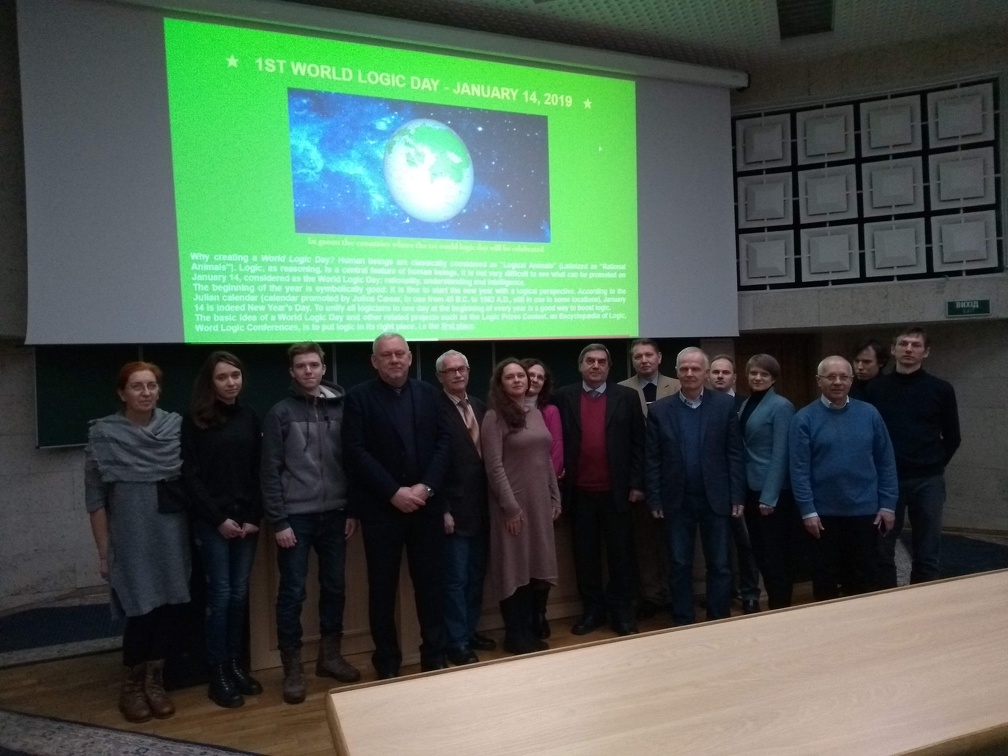2019
Всесвітній День логіки
Нагадуємо всім колегам, що нещодавно запропоновано відзначати 14 січня як Всесвітній День логіки. Ініціатива належить дослідникам з Logica Universalis Association.

Дата 14 січня прив'язана до двох символічних подій у світі логіки: народження Альфреда Тарського та смерті Курта Ґьоделя.

На даний момент до ініціативи відзначення долучилися професійні осередки у 34 країнах світу. Причому, в країнах з потужними науковими школами відзначення відбуватиметься в багатьох місцях одразу. Так, у Польщі заявлені заходи у 8 різних закладах, розташованих у 7 містах цієї країни.
Офіційна сторінка 1-го (цьогорічного) Всесвітнього Дня логіки в Інтернеті (з переліком усіх, хто долучається до відзначення):
В Україні зголосилися відзначати поки тільки в Київському національному університеті імені Тараса Шевченка на факультеті комп'ютерних наук та кібернетики. Як вказано у попередній новині, заплановано провести науковий семінар (з можливістю дистанційного відеопідключення) та установчі збори Українського логічного товариства.
Якщо ви бажаєте долучитися, або паралельно провести якісь заходи, присвячені Всесвітньому Дню логіки, у своєму навчальному чи науковому закладі та місті, сповістіть, будь ласка, організаторів, написавши на ел. адресу, вказану в попередній новині.
Workshop “Logic and its Applications”
[en] As we planned, the theoretical workshop “Logic and its Applications” was organized in Taras Shevchenko National University of Kyiv at the Faculty of Computer Science and Cybernetics on January 14 within the framework of the celebration of the 1st World Logic Day.
The workshop had 15 talks, including two remote ones, made in a teleconference mode (from Moldova and Australia). A summary of abstracts and the topics presented at the workshop can be found in the file attached to this page.
[uk] Як і було заплановано, 14 січня цього року в рамках відзначення 1-го Всесвітнього Дня логіки в Київському національному університеті імені Тараса Шевченка на факультеті комп'ютерних наук та кібернетики було проведено теоретичний семінар «Логіка та її застосування».
На семінарі було 15 виступів, у тому числі два віддалених, в режимі телеконференції (з Молдови та Австралії). Зведену збірку тез та тем виступів, здійснених на семінарі, можна знайти в долученому до цієї сторінки файлі.
| Перегляд | Причіплений файл | Розмір |
|---|---|---|
| Book of Abstracts.pdf | 212.73 КБ |
Українське логічне товариство
14 січня цього року, в 1-ий Всесвітній День логіки в Києві ініціативною групою логіків було утворено Українське логічне товариство (УЛТ) як неформальне об'єднання логіків України.
На даний момент Товариство є неформальною спільнотою, тобто, не має статусу юридичної особи. Приєднатися можуть всі охочі фахівці: учені, філософи, інженери — професійна робота або особисті інтереси яких лежать в області логіки та суміжних дисциплін (як з боку математики, так і з боків філософії, інформаційних технологій, мовознавства та психології). Вступ до УЛТ не накладає ніяких зобов'язань.
Головою УЛТ обрано Нікітченка Миколу Степановича, доктора фізико-математичних наук, професора, завідувача кафедри теорії та технології програмування факультету комп'ютерних наук та кібернетики Київського національного університету імені Тараса Шеченка.
Електронна адреса Товариства: UkrainianLogicSociety@gmail.com
Звертаємо увагу на те, що адреса змінилася з часу утворення (тези для участі в семінарі «Логіка та її застосування» надсилалися на скриньку з дещо іншою назвою). Це пов'язано з вибором англомовної версії назви Товариства. Після нещодавнього нетривалого обговорення було погоджено, що офіційна назва УЛТ англійською має бути такою: Ukrainian Logic Society (ULS) [а не «Logical», як було запропоновано попередньо].
Запрошуємо долучатися до Товариства всіх охочих фахівців. Найближчим часом буде оголошено про майбутні заходи УЛТ.
Всесвітній день логіки отримав визнання з боку ЮНЕСКО
Нині маємо чудовий привід привітати всю логічну спільноту: тепер ми офіційно маємо професійне свято. Всесвітній день логіки, який ми святкували цього року по всьому світу в рамках внутрішньої ініціативи у середовищі логіків, офіційно визнано ЮНЕСКО.
На 40-ій сесії Загальної конференції ЮНЕСКО, що проходила цього листопада у Парижі, день 14 січня офіційно оголошено Всесвітнім днем логіки, з приводу чого видано окрему прокламацію.
Жан-Ів Безйо, ініціатор проголошення 14 січня Всесвітнім днем логіки, нині — президент Бразильської академії філософії, розіслав з приводу рішення ЮНЕСКО лист, де він пише:
After the adoption of January 14 as the World Logic Day by the Executive Council of UNESCO on October 17, 2019, January 14 was officially proclaimed as the World Logic Day at the 40th session of the General Conference of UNESCO in Paris, November 12-27, 2019.
See below extracts of the text, related to the paper reporting the first edition celebrated in about 60 localities all around the world:
1st World Logic Day: 14 January 2019
https://link.springer.com/article/10.1007/s11787-019-00221-5
We encourage everybody to organize a celebration of the World Logic Day on January 14 2020 under the auspices of UNESCO.
Info about all the celebrations will be gathered in a single webpage with links to all the celebrations in the world as it was done for the 1st edition.
http://logica-universalis.org/wld
Here one of them already announced:
https://epimenides.usal.es/?q=en/programa-2020Best Wishes
Jean-Yves Beziau
Editor-in-Chief Logica Universalis
President of the Brazilian Academy of Philosophy
Далі він цитує прокламацію ЮНЕСКО, повний текст якої такий:
United Nations Educational, Scientific and Cultural Organization
General Conference
40th session, Paris, 2019
40 C/74
13 November 2019
PROCLAMATION OF A WORLD LOGIC DAY
OUTLINE Source: 207 EX/Decision 42.
Background: At its 207th session, in 207 EX/Decision 42, the Executive Board recommended “that UNESCO’s General Conference, at its 40th session,proclaim 14 January “World Logic Day”, in association with the International Council for Philosophy and Human Sciences (CIPSH)”.
Purpose: The report explains the historical, cultural and intellectual importance of logic for philosophy and the sciences; argues that the proclamation of World Logic Day would contribute to the development of logic, through teaching and research, as well as to public dissemination of the discipline and to the promotion of international cooperation in the field; and offers a rationale for UNESCO celebration of World Logic Day without financial implications, in close synergy with World Philosophy Day, drawing on the commitment of existing academic networks, and working in collaboration with the CIPSH.
Decision required: Paragraph 7.
1. The ability to think is one of the most defining features of humankind. In different cultures, the definition of humanity is associated with concepts such as consciousness, knowledge and reason. According to the classic western tradition, human beings are defined as “rational” or “logical animals”. Logic, as the investigation on the principles of reasoning, has been studied by many civilizations throughout history and, since its earliest formulations, logic has played an important role in the development of philosophy and the sciences.
2. Despite its undeniable relevance to the development of knowledge, sciences and technologies, there is little public awareness on the importance of logic. The proclamation of World Logic Day by UNESCO, in association with the International Council for Philosophy and Human Sciences (CIPSH), intends to bring the intellectual history, conceptual significance and practical implications of logic to the attention of interdisciplinary science communities and the broader public.
3. A dynamic and global annual celebration of World Logic Day aims at fostering international cooperation, promoting the development of logic, in both research and teaching, supporting the activities of associations, universities and other institutions involved with logic, and enhancing public understanding of logic and its implications for science, technology and innovation. Furthermore, the celebration of World Logic Day can also contribute to the promotion of a culture of peace, dialogue and mutual understanding, based on the advancement of education and science.
4. On 14 January 2019, the first World Logic Day was celebrated as an initiative of universities, research institutes, foundations and associations active in the fields of mathematics, philosophy, computer sciences, engineering, economics and cognitive sciences. The existence of these networks, and their commitment to future annual celebrations of World Logic Day, offer credible assurance that the proclamation of the Day by UNESCO, in association with the relevant member organizations of the CIPSH, will lead to a solid action plan towards impact and added value. UNESCO’s commitment to World Logic Day will ensure that it has a broader and more geographically diverse orientation and connects organically to established programme priorities in the humanities.
5. The initiative has no financial implications for UNESCO. Celebrations would be organized, drawing on their own resources, by institutions in Member States and by international partners, including especially CIPSH member organizations, in particular the Division for Logic, Methodology and Philosophy of Science and Technology of the International Union for History and Philosophy of Science and Technology (DLMPST/IUHPST). The work of the Secretariat to coordinate World Logic Day would be absorbed within the human capacities already assigned to development of humanities workstreams, in close synergy with the annual celebration of World Philosophy Day. Coordinated planning of the two days will ensure a stronger presence of philosophy throughout UNESCO’s calendar, consolidate relations with academic stakeholders through the association with the CIPSH, and thus contribute to the strengthening of the humanities called for by the General Conference in 39 C/Resolution 29. Organization of specific activities by UNESCO, in particular at Headquarters, would be conditional on extrabudgetary support.
6. The Executive Board considered the above matter at its 207th session and recommended, in 207 EX/Decision 42, that the General Conference proclaim 14 January “World Logic Day”, in association with CIPSH.
Proposed draft resolution
7. In light of the above, the General Conference may wish to adopt a resolution along the following lines:
The General Conference,
Having examined 40 C/74,
Noting the recommendation of the Executive Board as contained in 207 EX/Decision 42,
Recalling UNESCO’s mandate in education, sciences and culture,
Also recalling that logic, as a discipline that encourages rational and critical thinking, is of paramount importance for the development of human knowledge, science and technology,
Further recalling that the dissemination of logic, a discipline that was developed by different civilizations and is based on the virtues of discourse and argumentation, can contribute to the achievement of a culture of peace, dialogue and mutual understanding among nations,
Noting that the proclamation of world logic day will have no financial implications for UNESCO,
Convinced that the proclamation of world logic day would contribute to the development of logic, through teaching and research, as well as to public dissemination of the discipline and to the promotion of international cooperation in the field,
1. Invites the Member States of UNESCO to celebrate world logic day every year, organizing national events on 14 January with the active participation of governmental and non-governmental, public and private institutions concerned, such as schools, universities, research institutes, philosophical and scientific associations, and others,
2. Invites the Director-General to encourage and publicize initiatives taken in this regard at the national, regional and international levels, working closely with the International Council for Philosophy and Human Sciences (CIPSH),
3. Proclaims 14 January “World Logic Day”, in association with the International Council for Philosophy and Human Sciences (CIPSH).
Другий семінар, присвячений Всесвітньому дню логіки
Маємо приємність повідомити колегам, що, оскільки міжнародне відзначення Всесвітнього дня логіки отримало офіційне визнання ЮНЕСКО, Українське логічне товариство започатковує традицію проводити 14 січня кожного року, у Всесвітній логічний день, теоретичний семінар з логіки та її застосувань.
Перший такий семінар ми провели цього року. Другий семінар з логіки та її застосувань відбудеться 14 січня вже наступного 2020 року.
Місце проведення: Київський національний університет імені Тараса Шевченка, факультет комп'ютерних наук та кібернетики, пр-т Академіка Глушкова, корп. 4Д, ауд. 01 (з холу прямо вниз сходами).
Початок семінару: 10:30.
Прохання до всіх зацікавлених подавати тези (1 стор.) на адресу logicukraine@gmail.com до 12 січня 2020 року.
